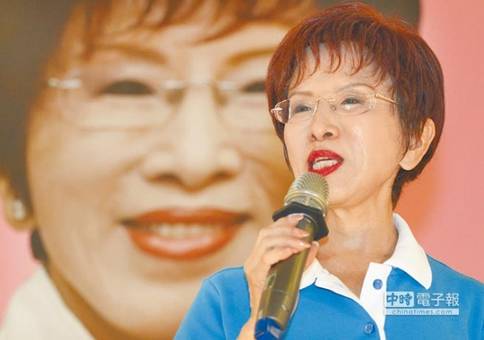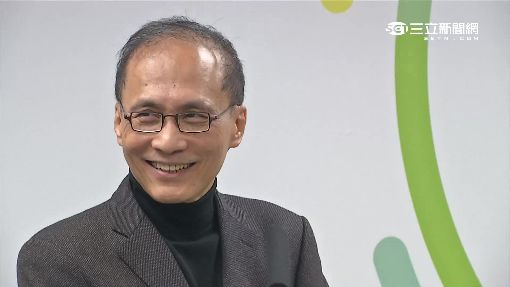by Brian Hioe
語言:
English
Photo Credit: Presidential Office
Are There Political Actors in Taiwan Who Should Not Be Trusted?
IT MAY BE of interest to note that as of late we see the frequent claim that one of the tasks facing Tsai Ing-Wen as president is to heal the political fractures in Taiwan between pan-Green and pan-Blue. The call for unity may sound fine and well in the realm of rhetoric—after all, who would oppose “political unity”? But it may be that there are political forces in Taiwan which are beyond being able to be reasoned with and that one should not, in fact, try to work with.
For example, Hung Hsiu-Chu, chairwoman of the KMT, was in attendance at Tsai Ing-Wen’s inauguration “out of respect” for democracy. Hung was later thanked for this on Facebook by Tsai. Yet at the same time, the KMT has stated that it does not have faith in the DPP’s ability to conduct cross-strait exchanges and that it will continue its efforts to influence cross-strait relations between China and Taiwan. This probably indicates that the KMT continues to seek a special relationship with China transcending that of the Republic of China, by way of party-to-party relations between the KMT and the CCP. This may take the form of special party-to-party meetings between KMT and CCP leaders, as in the meeting between Eric Chu and Xi Jinping which took place in Beijing in May 2015 in their capacities as heads of the KMT and CCP, and not in their official capacities as politicians of the ROC or PRC.
Indeed, when a political party takes foreign policy into its own hands, above the authority of the government it is a part of, that is undemocratic by nature. This only reflects the means by which the KMT does not view itself as one of two major political parties in Taiwan but as the rightful ruler of the Republic of China. The KMT clearly has its own agenda and in that way, as much as the call for bipartisan politics may sound like a positive matter, it would not be a trustworthy partner for the DPP or any other political actor in Taiwan. So when there is the call for cooperating with the KMT, what does this mean exactly, to cooperate with those whose interests are to sell out Taiwan?
 Hung Hsiu Chu. Photo credit: China Times
Hung Hsiu Chu. Photo credit: China Times
As such, if the outlook of the KMT further deteriorates and it becomes that KMT politicians begin to bolt the party for the DPP, such politicians are in all likelihood not to be trusted. Such politicians would have fled the party for the DPP because it was in no longer in their personal interest to stay in the KMT, rather than because of any political change of heart. This would also reflect the institutionalization and drift rightwards of the DPP, that it becomes possible for former KMT politicians to enter the DPP.
What can be done, however, is to try to win over pan-Blue supporters who may vote KMT, but vote KMT because of their pursuit of stability above all else. Pan-Blue voters do not consist homogeneously of Chinese nationalist diehards, after all. In examining the composition of pan-Blue voters, one finds that many of those who vote pan-Blue year after year are among Taiwan’s most marginalized individuals, such as Indigenous, Hakka, or members of the working class—who vote KMT because the KMT seems to them to offer a greater promise of stability than the DPP does, not only regarding cross-strait issues, but also economic ones.
Such individuals do not realize that the KMT and its institutions are precisely the agents of the systemic inequalities they face or if they do, rather than bank on something new, they vote for what they know better. If there is to be a call for “bipartisan politics” in the new administration, attempting to pry such individuals away from the pan-Blue camp is what bipartisan politics should mean—rather than attempting to cooperate with KMT politicians.
The Call for Bipartisan Politics As A Means to Deflect Criticism?
YET WE FIND in the claim that “bipartisan politics” is what is necessary now oftentimes disguises claims by pan-Green apologists that it is due time for Taiwanese activists to step back and let the politicians do their job. Taiwanese activists are seen as out of control or even as ideological extremists by some, given the number of government building occupations or attempted building occupations which have taken place in the past two years. But to begin with, the Tsai administration faces continual pressure from China and the KMT and some backsliding is inevitable. Oversight is always necessary from civil society groups and activists in order to prevent backsliding.
Likewise it is that politicians backslide inevitably once in office. In many cases, it is that the process of institutionalization inevitably leads to backsliding. Hence the need for oversight and critique to provide for political accountability at all times.
After all, if you leave it in the hands of the politicians without oversight, very often it is that they carry out policies exactly opposite to what they promised during their campaigns once elected. We already see this phenomenon quite early with the Tsai administration, insofar as the Tsai administration initially intended to continue to push for the CSSTA trade bill which prompted the Sunflower Movement occupation in 2014. This occurred despite the degree to which Tsai administration coasted off momentum from post-Sunflower Movement civil society to be voted into office—until further backlash prompted the Tsai administration to back away from this plan.
 Lin Chuan, Tsai’s premier, initially took the stance of continuing to push for the CSSTA trade bill with China before this prompted further backlash and the Tsai administration had to back away from this stance. Photo credit: SET
Lin Chuan, Tsai’s premier, initially took the stance of continuing to push for the CSSTA trade bill with China before this prompted further backlash and the Tsai administration had to back away from this stance. Photo credit: SET
We see similarly with the proposed cross-strait oversight bill to regulate cross-strait legislation between China and Taiwan in the future, in which the DPP’s original proposal did not differ substantially from the KMT’s and would have still passed into law trade bills with China without discussion. This also required public outrage before the bill was amended.
We see progressive developments with quick actions by the Tsai administration to repeal changes to the Taiwanese education curriculum which saw protest in August 2015 with the occupation of the Ministry of Education. However, at other points, Tsai administration officials have evinced a contempt for the sufferings of common people and a contempt for activists that can be labelled as technocratic in nature.
Thus, the call for “bipartisan politics” or the “unity against political divisions” sometimes serves as a cipher for a call to shelve critique of the government, in order to allow the current DPP administration take on policies of the previous KMT administration through accommodation to the institutions of government without criticism. As such, in such cases, if a politics which transcends the Green/Blue political divide is needed, perhaps what is needed above all else at this juncture is to be critical of all political camps, including both Tsai’s current presidential administration and a KMT camp which now for the first time finds itself in the role of a political opposition. Such would be the only way of maintaining accountability on the part of politicians and pushing towards the development of a Left, progressive politics in Taiwan that can transcend party divisions.

